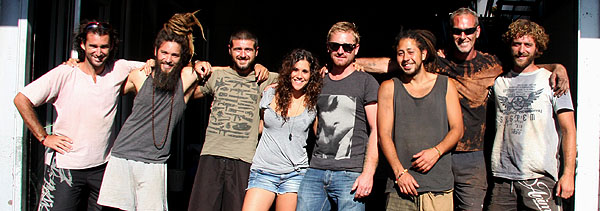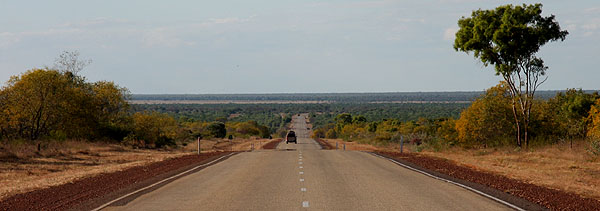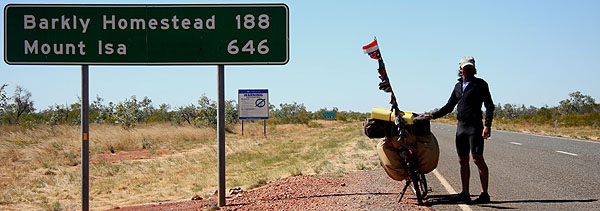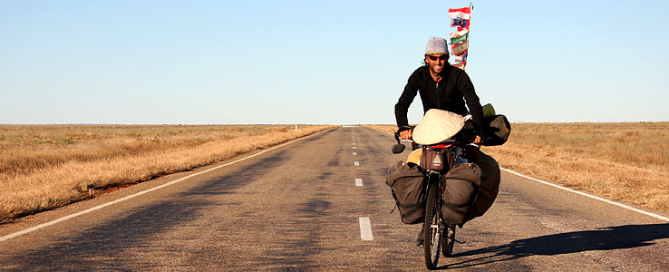Australia – 95,742 Km
I arrived to Australia by plane, from East Timor. I was curious for this new country; it was the fourth continent to cross.
When I arrived to Darwin I contacted Fran, an Argentinean guy who had more than 3 years traveling the world by bicycle, the last one through Australia. Fran was an ex professional golf player who spent all his time surfing and in his free time, working. The guy from Cordoba, was like a godfather in the new country, immediately he made me give up my absurd idea: “search for cheaper accommodation”. “There are no such places in the kangaroos land”, he said to me and in few minutes, he explained me to strictly enforce the rules to travel through Australia with a low-budget.
Rule 1: Never pay for accommodation, rule 2 to cook everyday, rule 3, stock up before starting to cycle.
I just came from Asia, where I had been riding the last 4 years and where, in most places it was possible to get a room per 10 u$s and a plate of food per 2 or 3 u$s. But in Darwin many things seemed way too expensive, like the kilo of bananas which cost usd 15 or the kilo of tomato 13 usd. According to what people explained to me, due to the last heavy rainy season, a lot of plantations were destroyed, and therefore in order to protect domestic production the prices of the most of plantations were highly inflated, due to the importation was never an option. Therefore, as many other travelers with low budget, I have to abstain to the most fruits and vegetables.

Most of my “new friends” had working visas, but in reality they traveled more than they worked, thereby when the night came they preferred to leave the city and camp than look for accommodation. It is very common to find young travelers in Australia, who take a sabbatical year. The country’s authorities often give working visas for periods of one year to young graduates under 30. They are from all nationalities, but mainly I have met people from Germany, France and the United States. Australia is the perfect country for traveling, because it is safe, there is enough work, it is well paid and even because there are public toilets and showers in every town and city. Therefore many travelers live in their own vehicle or in the street.
During my stay in Darwin I met Greg, an Australian guy who is united with the Aboriginal people, because of the passion for the didgeridoo, the ancient wind instrument used by Aborigines. According to Greg, Darwin is characterized by the highest proportion of Aboriginal people (10%) of any capital city in Australia.

“The Australian Aborigines are the descendants of early inhabitants of the continent”, he said. “They lived a life of hunter-gatherers and lived in semi-nomadic groups which roamed large areas hunting with spears and boomerangs, fishing in canoes and gathering fruits and plants. Having no written language, they passed on their own knowledge through stories and songs”.
“When the English came to Australia in the late XVIII century, it is estimated that there were between 300,000 and 750,000 Aboriginal in over 200 countries concentrated mainly in the east and south. These nations were united by alliances, and each one had its own customs and their own language. But European diseases, that the settlers brought with them, (such as smallpox, chickenpox, measles and tuberculosis) eventually destroyed the local population, together the direct violence and the loss of land. The Aboriginal population was reduced by 90%.
During my stay in Darwin, in order to raise money to keep traveling, I went to the main weekend markets. So, I contacted to the organizers who always provide me with a space to exhibit my bike and the map of my journey. Therefore I showed some photos and media articles of my trip to the most curious people, who bought my souvenirs, which, as usual, I sell in the most expensive countries.
My trip through Australia was more loaded than ever before, I sent several kilos of luggage to Sydney by mail to load all the food needed. Yet my third day on the road, passing by Katherine, a small town in the vastness of the Northern Territory, I entered the supermarket which would be the last available place where I bought 10 kilos of food. The Northern Territory is the most inhospitable state of the country, the distances between populations or hostels reach nearly 300 km. On two occasions, the distance between supermarkets ended up being 700 km.

So I loaded the food for the 35 meals per week I needed to get the next supermarket and that determined the stop of a day to rest. As for the water, I stood on the side of the road, asking people in the cars driving with a sign. The Australians have inculcated the art of camping, possibly more than any other country in the world, often traveling for a couple of weeks to months around the country by car, truck or caravans with satellite TV and even a piano.

As I entered each time the temperature was lower and the wind that always blows from the southeast would not let me move faster than 15 km/h. I had been warned that the dry season is the only time in which you can cross the country from north to south, because the routes are not flooded, but the wind that was blowing strongly, counter-clockwise can even determine who is driving.
It took me a few days to understand that it is better to ride my bike at night. During the first 2300 km route to Sydney, I used to get up very early, and without having breakfast, start cycling for two hours, I would stop for breakfast and then continue riding for another hour, until the pedaling speed was 11 or 12 km/h. At sunset I began to pedal again and often did until 10 pm, or until I reached 100 or 120 km routes.

Pedaling through the Northern Territory became one of the biggest challenges of the trip[:]


